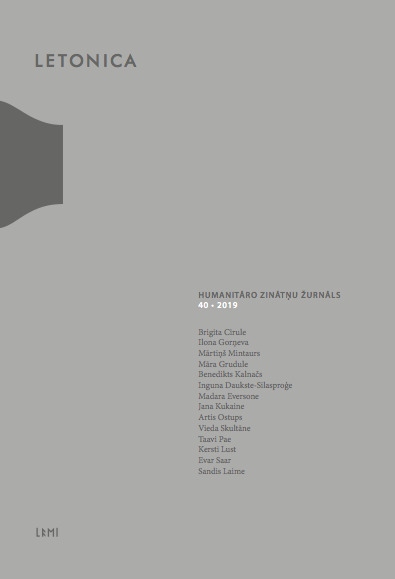Latvijas Padomju rakstnieku savienība pirmajā padomju okupācijas gadā (1940–1941)
Latvian Union of Soviet Writers in the First Year of Soviet Occupation (1940–1941)
Author(s): Madara EversoneSubject(s): Cultural history, Latvian Literature, WW II and following years (1940 - 1949)
Published by: Latvijas Universitātes Literatūras, folkloras un mākslas institūts
Keywords: Latvian SSR; Union of Writers; sovietisation; ideologization of literature; cultural politics; archival research;
Summary/Abstract: The key task of the creative unions in the Soviet totalitarian regime was to become administrative self-governing institutions of writers, artists, musicians and other intellectual professions. The aim of such institutions was to ensure control of the Communist Party over the creative intelligentsia. In October 1940 the Organizational Committee of the Latvian SSR Union of Writers was founded. Until the First Congress of the Union of Writers, which took place on June 14-16, 1941, the Organizational Committee was led by chairman Jānis Niedre. During this time, several important tasks had to be carried out – new members had to be enrolled, new socialist writings had to be facilitated, the heritage of Latvian literature had to be revised, the political and ideological education of writers had to be provided, etc. In autumn 1940, the Communist Party and Soviet authorities had worked out a strategically farsighted tactic in relation to the enrolment of writers into the Union of Writers. It was stipulated that talented, well-known writers should be enrolled, so that their talent would be used and adjusted according to the principles of the new ideology. In the so-called Year of Terror it was planned to issue a new schoolbook on the history of Soviet Latvian literature and to revise the pre-Soviet literary heritage of Latvia, in order to gather works that could be submitted to Moscow for translation into Russian and other languages of the socialist republics. However, this intention was not achieved, since Latvians lacked works that were written in the aesthetics of Socialist Realism and which revealed the life of the proletariat in the new circumstances of the Soviet Union. The plans were also put on hold by active warfare in the territory of Latvia. When the First Congress of the Union of Writers approached, an increasing ideological pressure was exerted on writers. One example was playwright Mārtiņš Zīverts, who the Soviet authorities had planned to involve in both writing the first Soviet play and the work of the Union of Writers, as well as in the further development of Socialist Realism. In the early years of the Union of Writers, Jānis Niedre was a crucial employee, since he had several responsible positions in the nomenclature of the Communist Party and he led the work of the Union of Writers. Due to his activity and loyalty to the Communist Party, the Latvian Union of Soviet Writers was the first of the so-called creative unions that was established in the first year of the Soviet occupation and not after World War II like the rest of the creative unions of the Latvian SSR.
Journal: Letonica
- Issue Year: 2019
- Issue No: 40
- Page Range: 77-96
- Page Count: 20
- Language: Latvian

